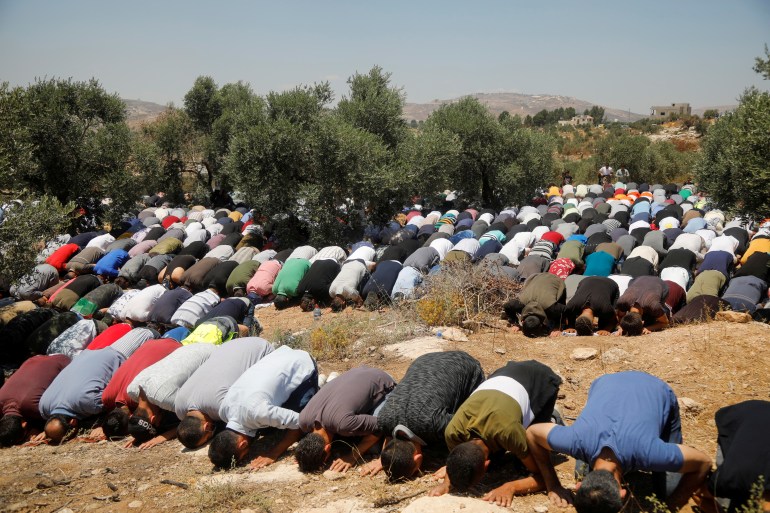Palestinian village pays high price in defence of its land
Israeli settlers have made regular raids into Beita to chop down olive trees, vandalise property, and provoke locals on their land.
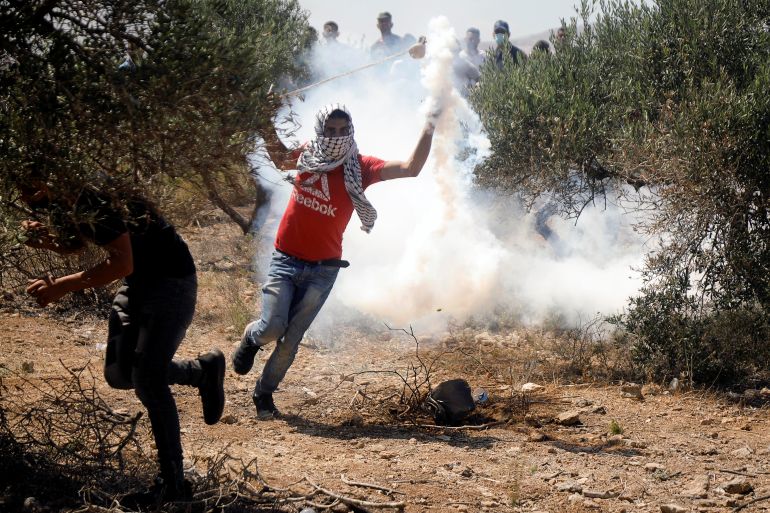
Beita, Occupied West Bank – This picturesque little town with its narrow winding roads and steep hills dotted with olive trees and stone houses turned into a bloody battleground as Palestinian protesters clashed with Israeli forces over the building of an illegal settlement on their land.
Beita activists called on residents to fight the continuing takeover of their land on Mount Sabih by Israeli settlers, who are currently building an illegal settlement and threatening the livelihoods of at least 17 Palestinian families – more than 100 people – who depend on harvesting their olives on land they have owned for generations.
Keep reading
list of 4 itemsIsraeli police attack Palestinians running to protest expulsions
Israel releases Sheikh Jarrah activists after hours-long arrests
Israeli settlers attack Palestinian village after shooting
“Today we had 50 injuries by rubber bullets, 26 wounded by live bullets, 190 cases of tear gas inhalation and 27 other injuries, including beatings,” said Fawas Beitar, a Palestine Red Crescent Society (PRCS) paramedic and coordinator, on Friday.
“Two of the injuries are serious and involve a live bullet shot into the neck and another live bullet shot into the abdomen,” Beitar told Al Jazeera.
“Several ambulances were targeted by rubber bullets, two paramedics suffered injuries by tear gas inhalation and rubber bullets, respectively.”
Following a call to action by the Palestinian activists, trouble was already brewing early Friday afternoon before the communal prayers had ended.
In an effort to prevent people from reaching the protest site, Israeli soldiers stopped taxis on the main road between Ramallah and Nablus and forced them to take alternative routes.
This necessitated a circuitous journey on foot and private car through the hills in the direction of a towering, billowing plume of smoke on the horizon where clashes had broken out.
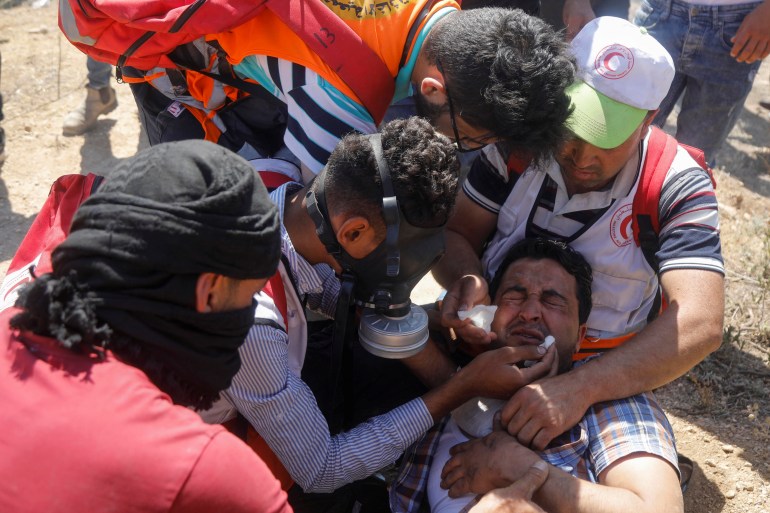
Throughout the day, groups of young men, observed by journalists on a hilltop, played a game of cat and mouse as they attempted to move down the valley, across a dirt road where Israeli vehicles and soldiers were stationed, and up Mount Sabih towards the settlement to protest.
Two young men with blackened hands, who declined to be photographed for security reasons, told Al Jazeera the settlers made regular raids into Beita – chopping down olive trees, vandalising property and provoking the locals – and had already wounded many young men.
“They will not take our land before they have killed all of us,” Ahmed said.
Israeli drones armed with tear gas canisters flew overhead periodically before hovering above the young men and dispensing their loads.
Through binoculars, Al Jazeera observed Israeli soldiers firing towards the young men with live rounds, rubber-coated steel bullets and tear gas.
Ambulances raced past to pick up the wounded, confirming the injuries to waiting journalists before evacuating the patients to a field hospital.
The ambulances, sometimes travelling in convoys, raced backwards and forwards until the early evening when the sound of screaming sirens eventually died down.
So numerous were the injuries that the PRCS turned a local school into a field hospital for emergency treatment including triage, X-rays, and intravenous drips before patients were either released to go home or rushed to Rafidia Hospital in Nablus for further treatment.
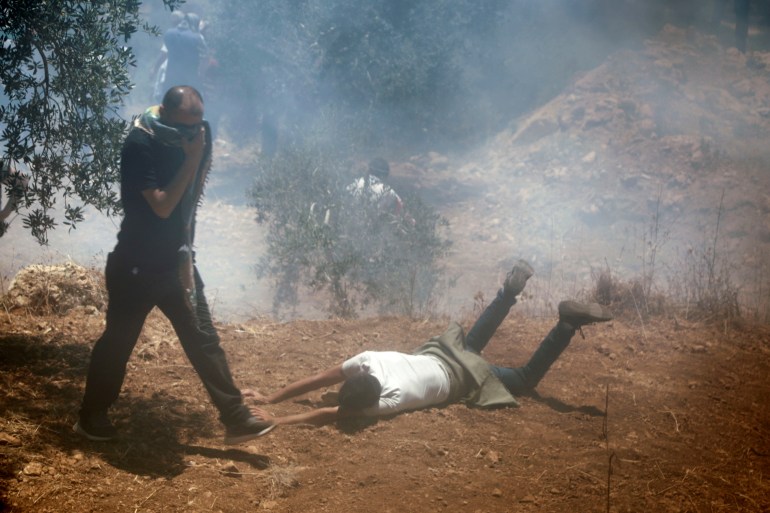
Muhammad Khabeisa – whose family has lived in Beita for more than five generations and has lost land to settlers – told Al Jazeera the Israelis had already taken two hectares (five acres) of village land and moved in about 45 prefabricated homes since the beginning of May.
He said villagers asked Israeli authorities for documentation proving their land ownership, which was provided. However, the documents are only valid for 45 days, Khabeisa noted.
“Each time we apply it costs 80 Israeli shekels [$25] and the documents are only valid for 45 days. So we went again about a week ago to apply for new documentation, but we’ve received no response yet,” Khabeisa said as he showed Al Jazeera the “expired” documentation.
“We then went to the Israeli police to say we wanted to open a case against the theft of our land, but were told the policemen responsible were not there and told to come back again. But every time we return, there is another excuse as to why they can’t help us.
“Furthermore, our lawyers told us that without new Israeli documentation showing land ownership they can’t fight the case in court,” said Khabeisa.
“The takeover of the land had previously had been gradual with Israeli soldiers using the land in the late 1980s as a temporary military base saying they would only use the land for short periods. However, afterwards they started laying concrete for construction but a senior military official still assured us that the land belonged to us.”
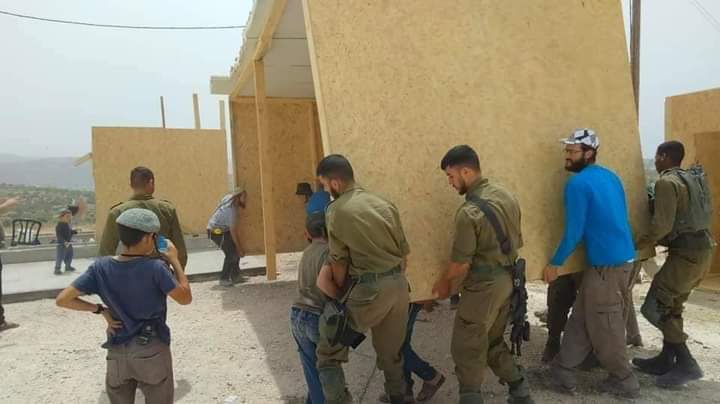
Previous cases filed by Palestinians asking for the return of land expropriated for illegal settlement building have taken years to be processed by Israeli courts, and only a fraction of the land has been returned.
“We believe the Israelis are delaying providing us renewed proof of our ownership because they want to establish facts on the ground by taking more land and building more homes so that even if we win in the end it will be impossible to reverse the established settlement,” said Khabeisa.
Musa Abu Muti, who has also lost land to the settlements, told Al Jazeera that Palestinians were not allowed to approach their olive orchards as the area had now been declared a closed military zone.
The settlers tried several weeks ago to take over another hilltop belonging to Beita, but strong protests by the locals – during which a doctor and a teacher were shot dead by Israeli soldiers in addition to dozens of other injuries – temporarily prevented that takeover with Palestinians defiantly mounting a flag at its summit.
Beita town’s unity in the face of the land expropriation was evident in the organisation of the protests on Friday with young boys ferrying boxes of water and food cooked by Beita women to the young men on the front line as they took shifts during the confrontations.
As the sun set later that evening, a wary quiet settled on the town.
But later, closer to midnight, groups of men known as the erbak al-layli – or “night confusion units” – took up positions at various points in the valley, lighting fires in preparation for confronting settlers if they attempted to enter the town.
“So far there have been no deaths during the last few weeks, but the real test will be in September when olive-picking season begins and we are prevented again from approaching our orchards,” Khabeisa said.
Reports are now circulating the Israelis may call for construction on Mount Sabih to be stopped, but Khabeisa said the villagers will wait and see before they get their hopes up.
